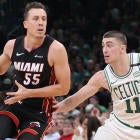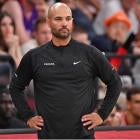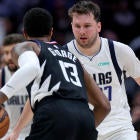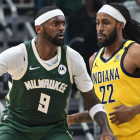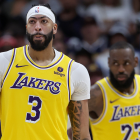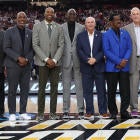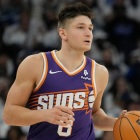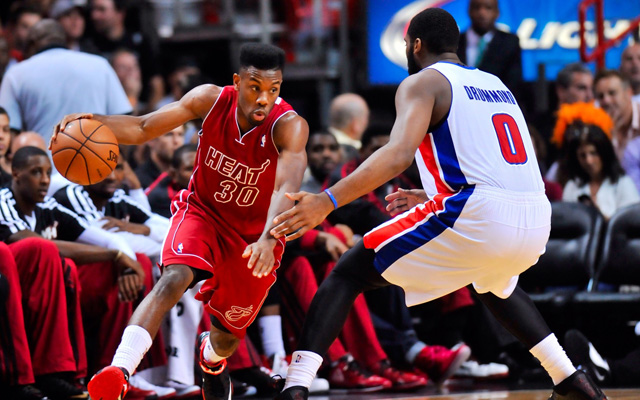
It seems infuriating on the surface. Why won't Coach X play younger Player Y over veteran Player Z? One has hops, effort, and natural ability. The other is broken down, slow, and doesn't produce. Just look at the per-36 numbers! And there's reason to subscribe to that belief. But the reasons for those decisions often have to do with the conflict between a player's individual production and his management of mental responsibilities.
For centers, this is often about defensive communication. When a point guard is getting ready to run the pick and roll, it's the big's job to communicate when the pick is coming and how to defend it. Younger players have never had this level of responsibility before the pro level and it leads to mistakes, which drive coaches crazy.
A good example of this is the growing pains the Pistons' Andre Drummond is going through. In an interview with Pistons.com, the phenom center talked about what he's learning from assistant coach Rasheed Wallace ("SHEEEEEEED!") about that this season.
“In high school, I didn’t have to talk,” he said after Thursday’s practice a day after the Pistons’ schedule was disrupted by the ice storm that ripped through the Southeast and forced postponement of Wednesday’s scheduled game in Atlanta. “All I had to say is ‘left’ or ‘right’ when a screen was coming. I didn’t have to say when a back-door (cut) was coming because we played a 2-3 zone, so it didn’t really matter. But in college, I wasn’t the best at it, either. That’s when guys are a lot better and they’re smarter with their cuts.”
It is perhaps the area where Rasheed Wallace, one of the NBA’s all-time great defensive communicators, can have the most influence in Drummond’s development. Wallace’s voice cuts through the din even today in NBA arenas from his seat one row behind the Pistons’ bench, barking out warnings of oncoming screens to Pistons guards or instructions for their big men.
“Just hearing somebody’s voice in center field, it helps our guards out to know where they need to go, when the screen is coming, when the back door is coming, when the flare is coming,” Drummond said. “When different things like that happen and we’re talking, it helps us all out in the long run.”
It requires a conditioning of the mind, Drummond admits, to maintain the vigilance required to read and react to what is expected of him as an individual defender while also providing constant traffic information for teammates around him.
“It’s kind of new for me,” Drummond said. “It’s always been something difficult for me. I kind of react instead of saying it. Being with Rasheed has taught me I have to speak up and do it at the same time, because a guard can’t read what I’m doing. They’ve got to hear what I’m saying before I do it first. That’s one of the things that I’m learning.”
via Talking the Talk | THE OFFICIAL SITE OF THE DETROIT PISTONS.
Drummond is an incredible force on the court, that's plain to see, and he needs to play. He looks like an impact player and one of the best players on the team, which he is. But did you know that the Pistons are 5.4 points per 100 possessions worse defensively with Drummond on court vs. off? That's the most of any heavy-minute rotation player for the Pistons.
How does a defensively dominant center accrue numbers like that? Well in part, it's because of the minutes, matchups, and lineups he plays a part of. Drummond is soaking up the tough parts of the game and that creates noise. Drummond is, instinctively, a good defender, but he's learning key elements of he game on the mental end. He'll continue to get better.
Now that still doesn't mean that the Pistons should be benching him in the fourth quarter of games. He's still a good player and a huge part of their future. Basically, if they can't figure out how to win with him on the court, they need to change what they're doing elsewhere. But it is an element that people forget when they ask why a young player isn't playing over a veteran. This kind of knowledge is institutional and takes time to learn and implement.
Drummond's future is bright, and the fact that he recognizes the need for improvement in this area only speaks highly of his attitude and work ethic.














